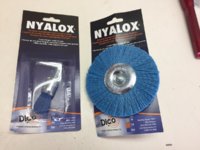Thanks!
It was quite a tough and long work to remove all corrosion. And I didn't want to use to rough things neither, just enough to help me get through but still without making big scratches. And I like this not completely chrome like finish that you can get on aluminium. My intention is to just take good care of the bike and, of course, take nice rides with it. Not to many projects...
It was quite a tough and long work to remove all corrosion. And I didn't want to use to rough things neither, just enough to help me get through but still without making big scratches. And I like this not completely chrome like finish that you can get on aluminium. My intention is to just take good care of the bike and, of course, take nice rides with it. Not to many projects...




